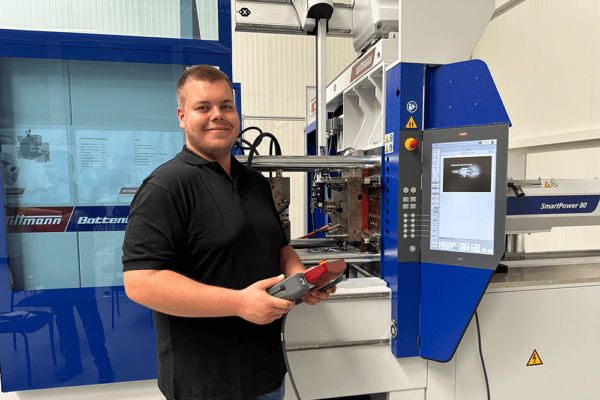
ENGEL ‘Skyrockets’ Out of COVID Crisis
ENGEL has painted an optimistic picture for the current fiscal year. “Our order books are as full as they last were in 2018. We have genuinely skyrocketed out of the crisis,” reports ENGEL’s CEO, Dr. Stefan Engleder.
At the same time, new challenges await the injection moulding machine manufacturer and system solution provider from Austria, above all the current supply bottlenecks in raw materials and components. “We have evolved during the crisis,” says Engleder. “We will master the challenges that lie ahead well.”
The change came about in November 2020. Even demand from the automotive industry picked up again after two challenging years. As a result, the 2020/2021 fiscal year came to a conciliatory end. With 6,400 employees around the world, the ENGEL Group generated 1.1 billion euros in sales revenues. Although sales revenues again fell compared to the previous year with a minus of 15%, ENGEL is expecting growth again for the current fiscal year. “If the upward trend consolidates, growth in the order of up to 20% is realistic,” says CSO Dr. Christoph Steger.
Demand increasing in all regions
The regional distribution of sales at the end of the 2020/2021 fiscal year reflects the impact of the crisis. Europe contributed 45% of Group sales revenues, well below the previous year’s share of 54%. The Americas accounted for 30% – compared to 25% the year before – and Asia for 23%, compared to 20% the year before. “The Americas and Asia – and China in particular – were the first to see the economy pick up again, and strongly,” says Steger. “But meanwhile, Europe is also clearly back on track.”
There were also shifts in the distribution of sales by business line. The Technical Moulding Division, in particular, saw significant growth. Technical Moulding includes the domestic products, sports, games and leisure segments, which experienced increased demand worldwide during the Coronavirus pandemic. There was also further growth in the medical business unit. Plastic products are making an important contribution to the fight against the pandemic. As a result, ENGEL has processed Covid-19-related orders with higher priority since the beginning of the pandemic.
Delivery capability ensured despite the shortage of materials
“Plastics are and will remain the material of the future – this is reflected in the strong and, above all, fast-growing demand,” says Steger. Although the strong order situation gives rise to optimism, there is still a degree of uncertainty that makes planning difficult.
“We have to be prepared for markets becoming more volatile and demanding more flexibility from us. So we have geared up for crises,” Stefan Engleder says. “Our global production network and the stronger focus on decentralised expertise in sales, service and processing engineering help us to act in a versatile way.”
The Coronavirus pandemic has not been defeated, the ENGEL Managing Directors emphasise. Lockdowns in individual countries and travel restrictions with quarantine rules are still making daily business difficult. But the biggest challenge at the moment is delivery bottlenecks in raw materials and components.
“The supply situation will see us face a couple of challenges in the next few months“, says Engleder. “Although ENGEL is able to ensure global delivery capability thanks to its international network of plants and the dual-sourcing strategy established several years ago, the cost gap is continuing to widen. The markets are overheated, and rising inflation is aggravating this effect. This will also have an impact on prices in machine manufacturing.”
Sustainability and digitalisation drive growth
The innovation and growth drivers currently include three major topics in particular: sustainability, digitalisation and the transformation of the automobile. All three areas are closely interlinked. “Sustainability only works with digitalisation” was the core message of this year’s ENGEL live e-symposium.
“Digitalisation helps us to leverage the full potential of the injection moulding machine and to make production more efficient and sustainable by doing so,” says Stefan Engleder. “If we genuinely make use of digitalisation, the CO2 reduction targets set by politicians will suddenly no longer seem impossible.”
With innovative products and technologies, ENGEL contributes to building up a circular economy for plastics. This, in turn, plays an essential role in improving sustainability in the plastics industry.
Sustainable mobility, in turn, is the driver for transformation in the automotive industry. Regardless of which alternative drive technology prevails in the long term, the proportion of plastics in automobiles will continue to rise. Lightweight remains a key prerequisite for sustainable mobility and requires innovative injection moulding solutions.
Innovative strength is the basis for success
Innovative strength is an important basis for success, especially in challenging times and the springboard when the economy picks up again. “We have continued to pursue our development goals with undiminished vigour over the past year and a half,” reports Engleder. Each year, ENGEL invests 70 million euros in research and development. In the inventor rankings published annually by the Austrian Patent Office, ENGEL is consistently among the top ten companies with the most patent applications. In the latest report for 2020, ENGEL ranks fourth.
“Our products, technologies and solutions, put us in an excellent position to optimally meet our customers’ current and future requirements,” emphasises Engleder. “Together, we will master the challenges that lie ahead well.”

ENGEL
+44 (0) 1926 335000
Website
Email





